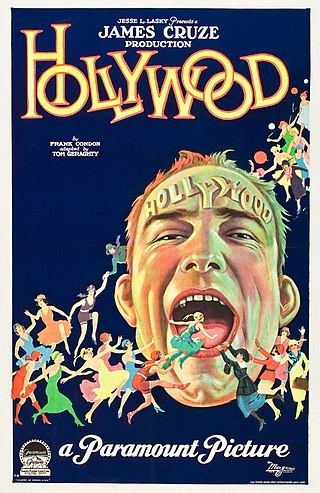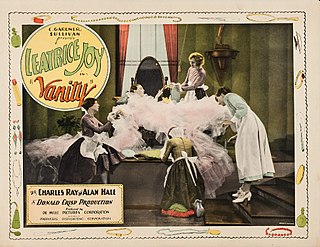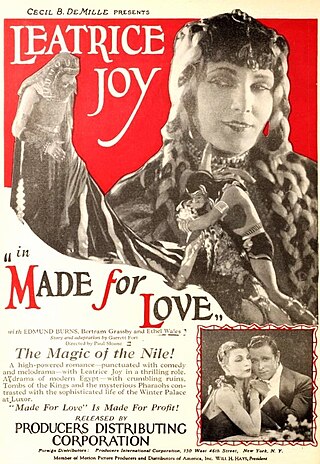
Chicago is a 1927 American silent crime comedy-drama film produced by Cecil B. DeMille and directed by Frank Urson. The first film adaptation of Maurine Dallas Watkins' play of the same name, the film stars Phyllis Haver as Roxie Hart, a fame-obsessed housewife who kills her lover in cold blood and, after trying to coerce her husband into taking the blame, is put on trial for murder.

Leatrice Joy was an American actress most prolific during the silent film era.

The Volga Boatman is a 1926 American silent drama film directed by Cecil B. DeMille, who reportedly said the film was, "his greatest achievement in picture making". The film's budget was $479,000 and it grossed $1.27 million. The film was highly successful, turning William Boyd into matinee idol overnight.

Robert Edeson was an American film and stage actor of the silent era and a vaudeville performer.
![<i>For Better, for Worse</i> (1919 film) [[1919]] [[film]]](https://upload.wikimedia.org/wikipedia/commons/thumb/3/3c/For_Better%2C_for_Worse_%281919%29_-_Ad_2.jpg/320px-For_Better%2C_for_Worse_%281919%29_-_Ad_2.jpg)
For Better, for Worse is a 1919 American silent drama film directed by Cecil B. DeMille and starring Gloria Swanson. The film was the second of four "marriage films" directed by DeMille and the second DeMille film starring Gloria Swanson. For Better, for Worse was adapted for the screen by William C. DeMille. Jeanie MacPherson wrote the film's scenario.

Saturday Night is a 1922 American silent romantic comedy film directed by Cecil B. DeMille and starring Leatrice Joy, Conrad Nagel, and Edith Roberts. It was Leatrice Joy's first film with DeMille.

Manslaughter is a 1922 American silent drama film directed by Cecil B. DeMille and starring Thomas Meighan, Leatrice Joy, and Lois Wilson. It was scripted by Jeanie MacPherson adapted from the novel of the same name by Alice Duer Miller. Art direction and costumes for the film were done by Paul Iribe.

Triumph is a 1924 American silent drama film directed by Cecil B. DeMille and starring Leatrice Joy and Rod La Rocque. It was based on a 1924 novel of the same name by May Edginton. The novel had previously been serialized in 1923 by The Saturday Evening Post.
Feet of Clay is a 1924 American silent drama film directed and produced by Cecil B. DeMille, starring Vera Reynolds and Rod La Rocque, and with set design by Norman Bel Geddes. The film is based on the 1923 novel by Margaretta Tuttle, and Beulah Marie Dix's one-act 1915 play Across the Border.

The Road to Yesterday is a 1925 American silent romantic drama film directed by Cecil B. DeMille. The film was based on a 1908 play of the same name by Beulah Marie Dix and Evelyn Greenleaf Sutherland and was adapted by Dix and Jeanie MacPherson. Art direction for the film was done by Paul Iribe, Anton Grot, Mitchell Leisen, and Max Parker.

Hollywood is a 1923 American silent comedy film directed by James Cruze, co-written by Frank Condon and Thomas J. Geraghty, and released by Paramount Pictures. The film is a lengthier feature follow-up to Paramount's own short film exposé of itself, A Trip to Paramountown from 1922.
The Dressmaker from Paris is a 1925 American silent romantic comedy drama film directed by Paul Bern. The story was written by Howard Hawks and Adelaide Heilbron. Heilbron also wrote the screenplay. The film starred Leatrice Joy and was her last film for Paramount Pictures. The film was costume designer Travis Banton's first assignment.

The Silent Partner is a 1923 American silent drama film produced by Famous Players–Lasky and released through Paramount Pictures. It was based on a series of articles from the Saturday Evening Post by Maximilian Foster and directed by Charles Maigne. Leatrice Joy and Owen Moore star in the feature. The film is a remake of the 1917 film of the same name.

Vanity is a 1927, American silent drama film directed by Donald Crisp and starring Leatrice Joy. The film was written by Douglas Doty, produced by DeMille Pictures Corporation and distributed by Producers Distributing Corporation.

A Girl's Folly is a 1917 American silent comedy film directed by Maurice Tourneur and starring Robert Warwick, Doris Kenyon, June Elvidge, Jane Adair, Chester Barnett, and Johnny Hines. Tourneur also played the director for the film within the film.

The Clinging Vine is a 1926 American silent comedy film produced by Cecil B. DeMille and Paul Slone and directed by Sloane. It was distributed by DeMille's Producers Distributing Corporation. The film is based on a 1922 Broadway play of the same name by Zelda Sears. The film was a starring vehicle for Leatrice Joy who left Paramount Pictures along with DeMille when he formed his own distributing company PDC.

Made for Love is a 1926 American silent drama film directed by Paul Sloane, produced by Cecil B. DeMille, and starring Leatrice Joy.

Toby Claude was an Irish actress and singer in vaudeville, on the Broadway stage, and in silent films.
A Most Immoral Lady is a 1929 American drama film directed by John Griffith Wray and written by Forrest Halsey. It is based on the 1928 play A Most Immoral Lady by Townsend Martin. The film stars Leatrice Joy, Walter Pidgeon, Sidney Blackmer, Montagu Love, Josephine Dunn and Robert Edeson. The film was released by Warner Bros. on September 22, 1929.

For Alimony Only is a 1926 American silent drama film directed by William C. deMille and starring Leatrice Joy, Clive Brook, and Lilyan Tashman.





![<i>For Better, for Worse</i> (1919 film) [[1919]] [[film]]](https://upload.wikimedia.org/wikipedia/commons/thumb/3/3c/For_Better%2C_for_Worse_%281919%29_-_Ad_2.jpg/320px-For_Better%2C_for_Worse_%281919%29_-_Ad_2.jpg)











